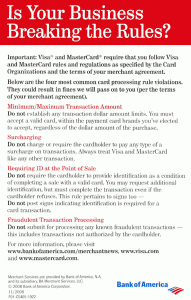Nothing makes purity more interesting than temptation. This applies to ideological purity just as much as the physical sort. As a libertarian, my greatest temptation to call for government action comes when I deal, as a retailer, with Visa and Mastercard (V/MC).
This post is not a call for government action, so I guess I am resisting temptation. But I at least need to vent, sort of like a monk pounding his head on the wall after getting the Victoria's Secret catalog in the mail. So here is my rant.
First, let's start with how credit card companies make their money. I will confess that I do not know how the card companies (V/MC) and the card processors (often large banks) split the take, so this is how they make money together. V/MC and the processors charge fees to merchants. Typically this is a fixed fee per transaction plus a percentage. On average, a merchant might be paying 2.5-3.5% of a transaction. The card companies also make money from card holders, charging annual fees, interest fees, etc.
You will have seen of late that most credit cards offer various loyalty programs, from airline miles to cash rebates. You might have thought those were marketing expenses paid by the credit card companies. Wrong. The card companies simply charge merchants a higher fee for processing transactions using these cards. In a sense, the card companies have organized with card users to use their power to extract extra value from merchants.
All of this I can generally live with. Visa and MasterCard, through both their credit facility and their implicit standardization, bring enormous value to retailers and customers. Its a big circular game anyway -- customers get 1% back and think they are getting a deal, merchants pay this extra 1% in fees, and then add it into the price of what they are selling. It's a wash, except to the extent that customers with reward cards in the end extract a bit of value from customers who pay cash (for reasons explained below).
For this value one must accept the typically arrogant and indifferent customer service provided by any monopoly (American Express is particularly awful to deal with as a retailer). But they are no worse to deal with than the government, so its unclear how the government could make the service any better.
What tends to tick me off, though, are rules and restrictions. Like the creeping work rules in the UAW contract, these are in many ways more insidious than the service and pricing. Here is what set me off today, from one of my card processors (in this case Bank of America, which, to be fair, is someone I would recommend for merchant account processing). Click to enlarge.

So, why are businesses breaking these rules so often? Let's take a look:
- No minimum transaction. Remember that V/MC charges a minimum fee, from 10-40 cents or so, per transaction. So if someone buys a pack of gum in our store, likely 100% of the sales price is going to V/MC. Typically it takes at least a one dollar total sale for there to be any money left over beyond paying cost of goods sold and the credit card folks. So merchants logically want to set a minimum. V/MC hates this practice, but it is rampant. I plead the fifth on our own practices.
- Surcharging. Credit card customers cost more than cash customers. Sure, we get some non-sufficient funds checks, but the eventual cost of these is nowhere near 2.5% of sales. Merchants logically don't like having their cash customers having to subsidize the frequent flyer rewards of their credit customers. However, unlike transaction minimums, card processors have mostly been able to drive out cash discounts.
- Requiring ID and Fraudulent Transactions. I will take these two together, since they are so ironic one after the other. V/MC is telling merchants that they can't check ID, which is the only reasonable approach to limiting fraud, but that they can't submit fraudulent transactions. You say that the text says "known fraudulent?" Well, read on --
To the latter point, I think most people assume that the credit card companies are absorbing the fraud, which is how they justify the fees they charge. Wrong again. Credit card companies only absorb credit risk. Over the last 10+ years, they have pushed fraud back on the retailer. If a consumer claims fraud on his card with some transaction, then the credit card company refunds the customer and takes the money from the merchant unless the retailer can absolutely prove he made delivery to the consumer personally (which he can't prove because he can't check identification) . Merchants bear the cost of fraud, not card companies. Which I could accept (since I have more ability than the card companies to control fraud) expect the card companies ban me from controlling fraud. So I have to take financial responsibility for something I am not allowed to prevent. And that really ticks me off.
Anyway, maybe someday we can organize a large merchant boycott, where, even for a day, we all refuse to accept Visa and Mastercard. Of course we would be breaking the rules, because that is not allowed by our V/MC agreement.
Postscript: I suspect that a few retailers with some power are starting to crack this, at least for themselves. Costco only takes American Express. Sams Club only take one card (MC, I think). My guess is that both, with their large size, bargained for exclusivity in exchange for concessions on fees and/or terms.
Postscript #2: I expect comments like, "Well so-and-so always makes me show an ID." I don't doubt you. I am merely saying that by doing so, they have either negotiated an exception to the V/MC agreement (very unlikely, as V/MC holds to these rules like the Maginot Line) or the retailer is breaking the rules.
